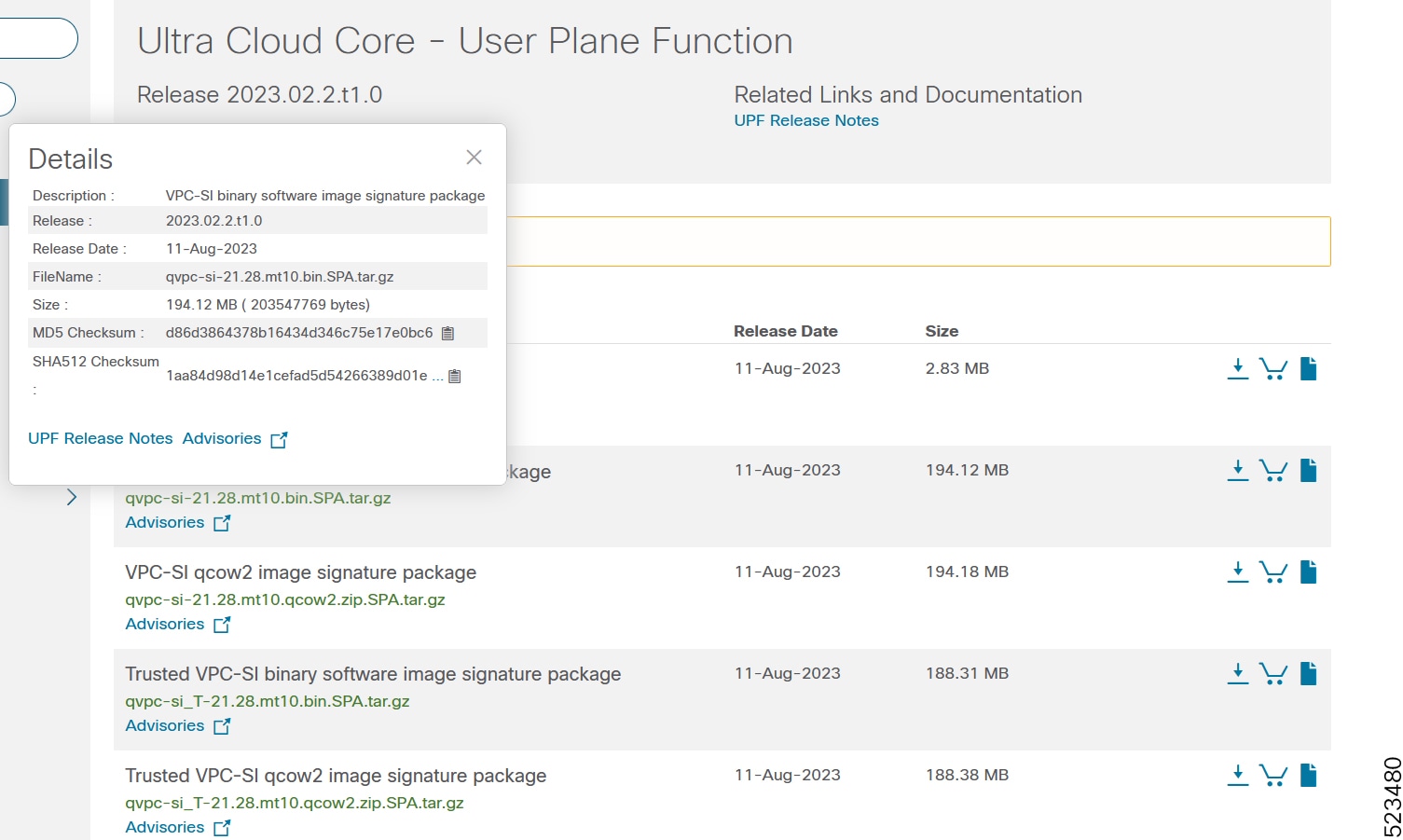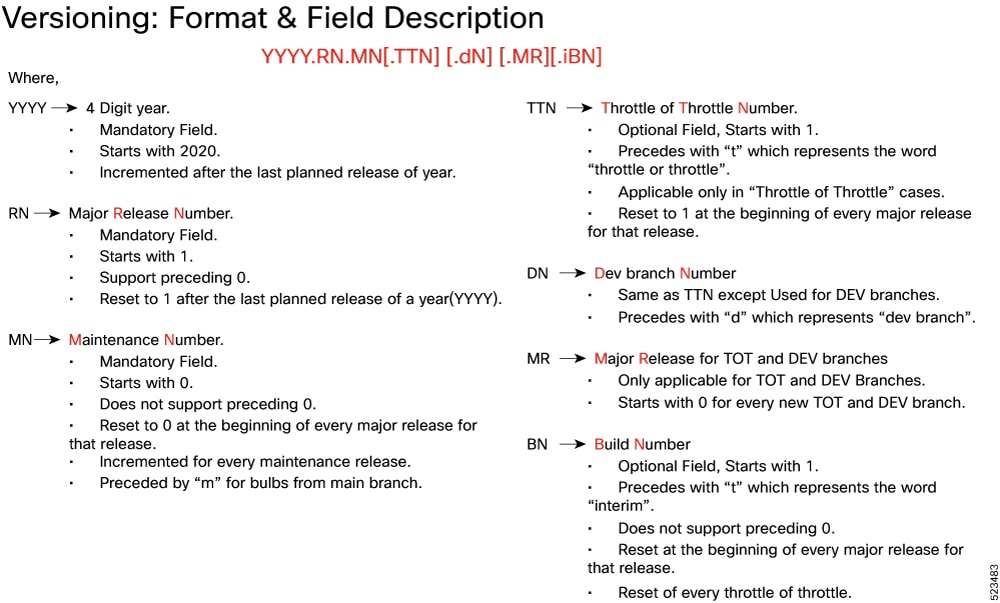Redundancy Configuration Manager, Version 2024.01.0
Introduction
This Release Notes identifies changes and issues related to this software release.
Release Lifecycle Milestones
|
Release Lifecycle Milestone |
Milestone |
Date |
|---|---|---|
|
First Customer Ship |
FCS |
31-Jan-2024 |
|
End of Life |
EoL |
31-Jan-2024 |
|
End of Software Maintenance |
EoSM |
31-Jul-2025 |
|
End of Vulnerability and Security Support |
EoVSS |
31-Jul-2025 |
|
Last Date of Support |
LDoS |
31-Jul-2026 |
These milestones and the intervals between them are defined in the Cisco Ultra Cloud Core (UCC) Software Release Lifecycle Product Bulletin available on cisco.com.
Release Package Version Information
|
Software Packages |
Version |
|---|---|
|
rcm.2024.01.0.SPA.tgz |
2024.01.0 |
|
NED package |
ncs-5.52-rcm-nc-2024.01.0 |
|
NSO |
5.52 |
Verified Compatibility
|
Products |
Version |
|---|---|
|
Ultra Cloud Core SMI |
2024.01.1 |
|
CDL |
1.11.6 |
|
Ultra Cloud Core UPF |
2024.01.0 |
What's New in this Release
New in Documentation
This version of Release Notes includes a new section titled What’s New in this Release comprising all new features, enhancements, and behavior changes applicable for the release.
This section will be available in all the 5G release notes and will supersede content in the Release Change Reference (RCR) document. Effective release 2024.01, the RCR document will be deprecated.
Features and Enhancements
There are no features or enhancements in this release.
Behavior Changes
This section covers a brief description of behavior changes introduced in this release.
| Behavior Change | Description |
|---|---|
|
Common-Config Directory Relocation |
Previous Behavior: The RCM common-config directory location was /var/lib/smi/data/common_config. New Behavior: The new path of the RCM common-config directory is /data/<rcm_ns>/common_config to retain the directory during SMI base image upgrade. The RCM configuration must include the following CLI: k8 smf profile rcm-config-ep config-mode NSO |
|
Prompting Wrong Route Modifiers |
This release introduces new CLIs to prompt wrong route modifiers in both RCM and UPF. The route modifier 50 is applicable to a Standby UPF/RCM node only. Hence, the Active/Pending Standby UPF will not accept the Standby route modifier value. Previous Behavior: The following CLI was supported in releases prior to 2024.01.0: rcm route-modifier destination rcm_vpnmgr_ip val <2..32> New Behavior: With this release, UPF and RCM controller will not accept out-of-limit route modifiers. If UPF or RCM controller receives an invalid route modifier, it disconnects TCP, and on reconnect UPF sends the available route modifier. The following rcm route-modifier destination CLI is enhanced to support the dry-run keyword: rcm route-modifier destination rcm_vpnmgr_ip val <2..32,50> dry-run { true | false } When dry-run is set to true (default value), it only prints the route modifier value and the UPF state will be sent to UPF. To send the route modifier to UPF, set dry-run to false . Customer Impact: If the CLI is used in a script, then the script must be updated with the enhanced CLI. |
|
Sending IP Pool Audit Message Periodically |
Previous Behavior: RCM did not support the timer to initiate IP pool audit periodically. New Behavior: With this release, RCM supports CLI commands to trigger the IP pool audit message manually (Exec mode CLI) and to configure the time interval between successive audits (RCM Service Configuration mode CLI). The following are the new CLI commands:
|
Installation and Upgrade Notes
This Release Note does not contain general installation and upgrade instructions. Refer to the existing installation documentation for specific installation and upgrade considerations.
Software Integrity Verification
To verify the integrity of the software image you have from Cisco, you can validate the SHA512 checksum information against the checksum identified by Cisco for the software.
Image checksum information is available through Cisco.com Software Download Details. To find the checksum, hover the mouse pointer over the software image you have downloaded.
The following screenshot is an example of a UPF release posted in the Software Download page.

At the bottom you find the SHA512 checksum, if you do not see the whole checksum you can expand it by pressing the "..." at the end.
To validate the information, calculate a SHA512 checksum using the information in Table 1 and verify that it matches either the one provided on the software download page.
To calculate a SHA512 checksum on your local desktop, refer to the following table.
|
Operating System |
SHA512 checksum calculation command examples |
|---|---|
|
Microsoft Windows |
Open a command line window and type the following command: |
|
Apple MAC |
Open a terminal window and type the following command: |
|
Linux |
Open a terminal window and type the following command: OR |
|
NOTES: filename is the name of the file. extension is the file extension (for example, .zip or .tgz). |
|
If the SHA512 checksum matches, you can be sure that no one has tampered with the software image or the image has not been corrupted during download.
If the SHA512 checksum does not match, we advise you to not attempt upgrading any systems with the corrupted software image. Download the software again and verify the SHA512 checksum again. If there is a constant mismatch, please open a case with the Cisco Technical Assistance Center.
Certificate Validation
RCM software images are signed via x509 certificates. Please view the .README file packaged with the software for information and instructions on how to validate the certificates.
RCM Ops Center Logging Levels
It is recommended to use the following logging levels for RCM Ops Center to ensure that logs do not overflow.
logging level application debug
logging level transaction debug
logging level tracing off
logging name infra.dpd.core level application off
logging name infra.dpd.core level transaction off
logging name infra.dpd.core level tracing off
logging name infra.application.core level application off
logging name infra.application.core level transaction off
logging name infra.application.core level tracing off
logging name infra.etcd_client.core level application warn
logging name infra.etcd_client.core level transaction warn
logging name infra.etcd_client.core level tracing off
logging name infra.virtual_msg_queue.core level application warn
logging name infra.virtual_msg_queue.core level transaction warn
logging name infra.virtual_msg_queue.core level tracing off
logging name infra.edr.core level application warn
logging name infra.edr.core level transaction warn
logging name infra.edr.core level tracing off
logging name infra.ipcstream.core level application warn
logging name infra.ipcstream.core level transaction warn
logging name infra.ipcstream.core level tracing off
logging name infra.memory_cache.core level application warn
logging name infra.memory_cache.core level transaction warn
logging name infra.memory_cache.core level tracing off
logging name infra.topology_lease.core level application warn
logging name infra.topology_lease.core level transaction warn
logging name infra.topology_lease.core level tracing off
logging name infra.ipc_action.core level application warn
logging name infra.ipc_action.core level transaction warn
logging name infra.ipc_action.core level tracing off
logging name infra.vrf_etcd_update.core level application warn
logging name infra.vrf_etcd_update.core level transaction warn
logging name infra.vrf_etcd_update.core level tracing off
logging name infra.config.core level application warn
logging name infra.config.core level transaction warn
logging name infra.config.core level tracing off
logging name infra.heap_dump.core level application warn
logging name infra.heap_dump.core level transaction warn
logging name infra.heap_dump.core level tracing off
logging name infra.resource_monitor.core level application warn
logging name infra.resource_monitor.core level transaction warn
logging name infra.resource_monitor.core level tracing off
logging name infra.topology.core level application warn
logging name infra.topology.core level transaction warn
logging name infra.topology.core level tracing off
logging name infra.transaction.core level application warn
logging name infra.transaction.core level transaction warn
logging name infra.transaction.core level tracing off
logging name infra.diagnostics.core level application warn
logging name infra.diagnostics.core level transaction warn
logging name infra.diagnostics.core level tracing offOpen Bugs for this Release
The following table lists the open bugs in this specific software release.
 Note |
This software release may contain open bugs first identified in other releases. Additional information for all open bugs for this release are available in the Cisco Bug Search Tool. |
|
Bug ID |
Headline |
|---|---|
|
RCM-Checkpointmgr crash due to fatal error concurrent map read and map write |
|
|
Stale data in RCM post switchover |
|
|
TCP hardening - Timeout observed during socket write during switchover |
Resolved Bugs for this Release
The following table lists the resolved bugs in this specific software release.
 Note |
This software release may contain bug fixes first introduced in other releases. Additional information for all resolved bugs for this release are available in the Cisco Bug Search Tool. |
|
Bug ID |
Headline |
Behavior Change |
|---|---|---|
|
CLI controlled rcm vpnmgr message to clear the contextpoolinfo in rcm controller |
Yes |
|
|
Active UPF is being assigned Standby UPF Route Modifier |
Yes |
|
| CSCwi40285 |
[soltest] RCM common config directory wiped out during SMI base image upgrade |
Yes |
Operator Notes
Cloud Native Product Version Numbering System
The show helm list command displays detailed information about the version of the cloud native product currently deployed.

The appropriate version number field increments after a version has been released. The new version numbering format is a contiguous sequential number that represents incremental changes between releases. This format facilitates identifying the changes between releases when using Bug Search Tool to research software releases.
Release Package Descriptions
The following table provides descriptions for the packages that are available with this release.
|
Software Packages |
Description |
|---|---|
|
rcm.<version>.SPA.tgz |
The RCM offline release signature package. This package contains the RCM deployment software, NED package, as well as the release signature, certificate, and verification information. |
|
ncs-<nso_version>-rcm-nc-<version>.tar.gz |
The NETCONF NED package. This package includes all the yang files that are used for NF configuration. Note that NSO is used for NED file creation. |
Obtaining Documentation and Submitting a Service Request
For information on obtaining documentation, using the Cisco Bug Search Tool (BST), submitting a service request, and gathering additional information, refer to https://www.cisco.com/c/en/us/support/index.html.
 Feedback
Feedback